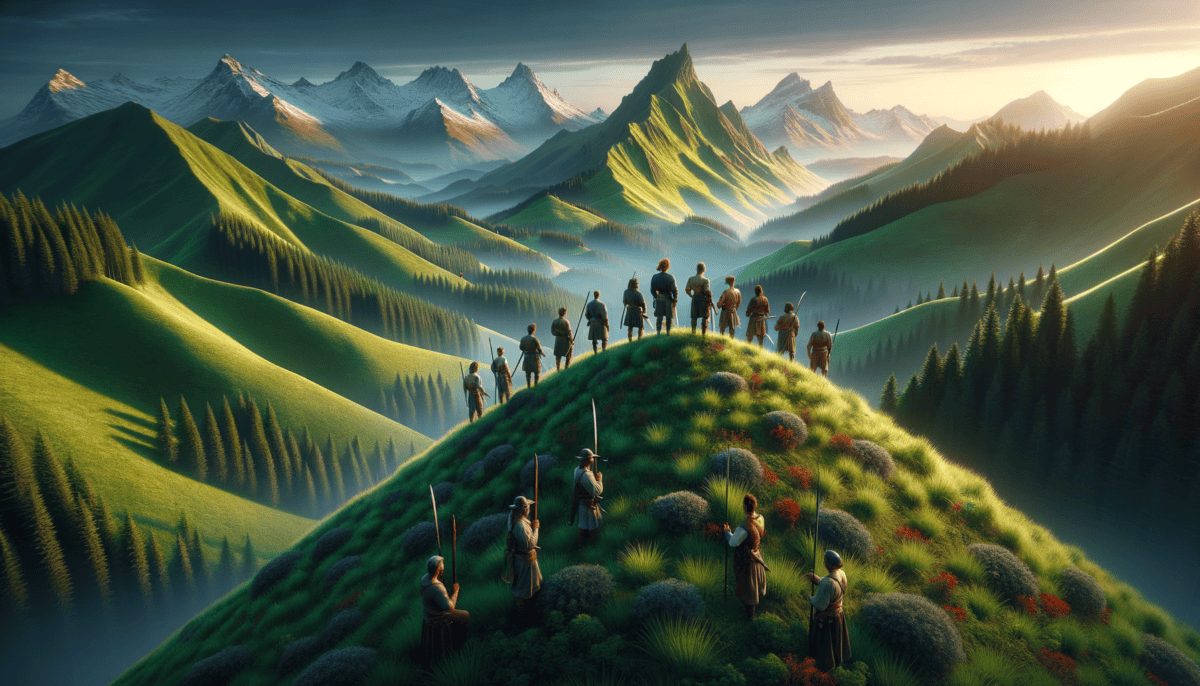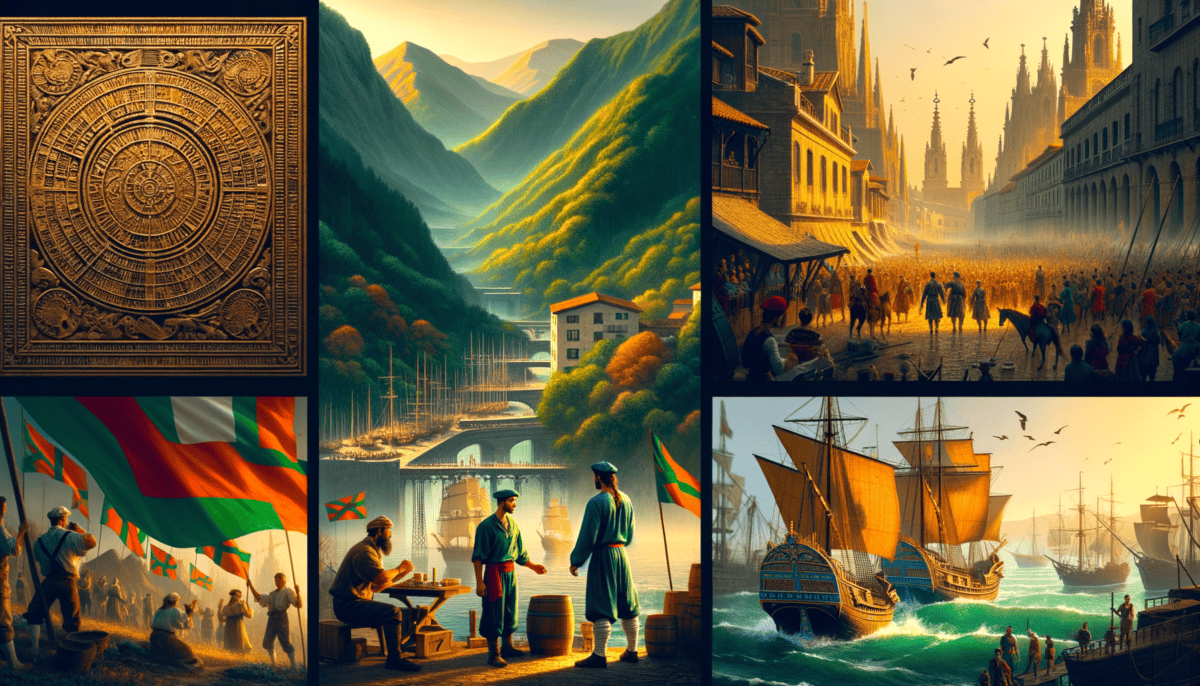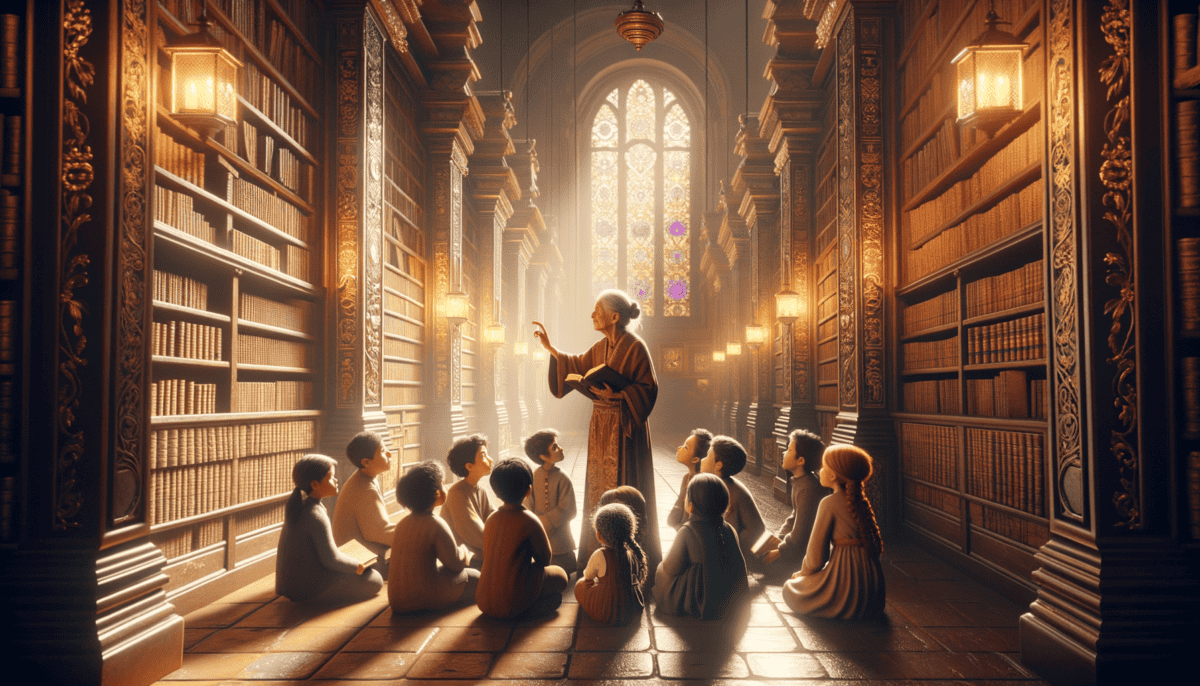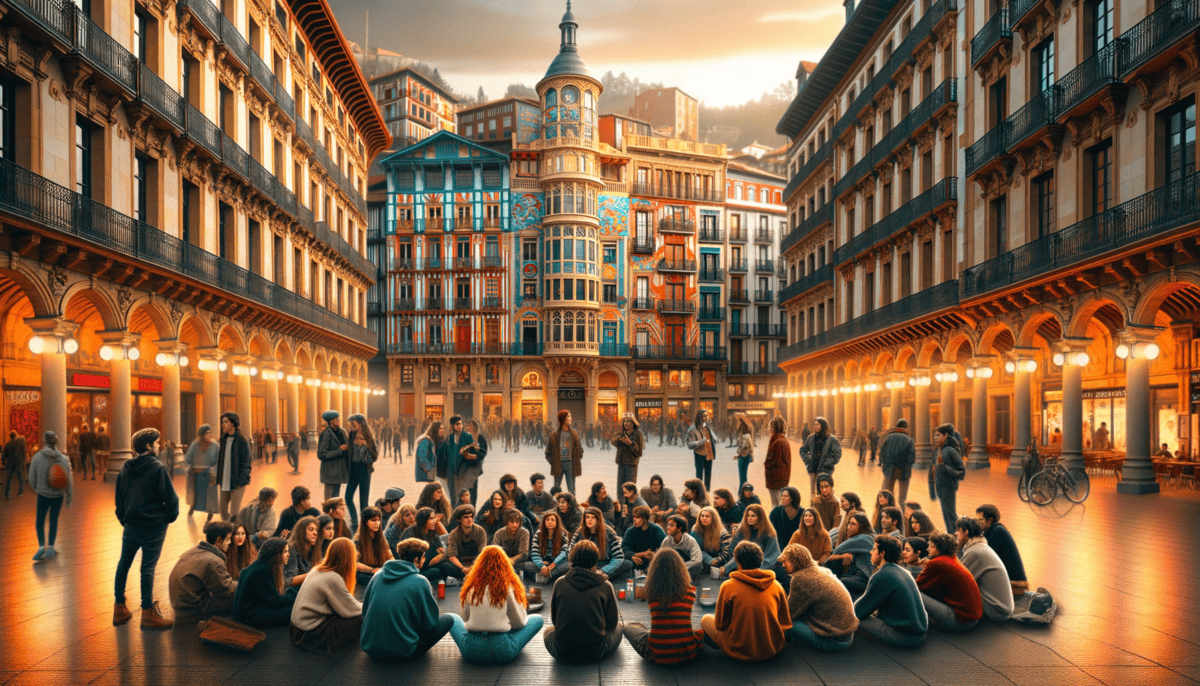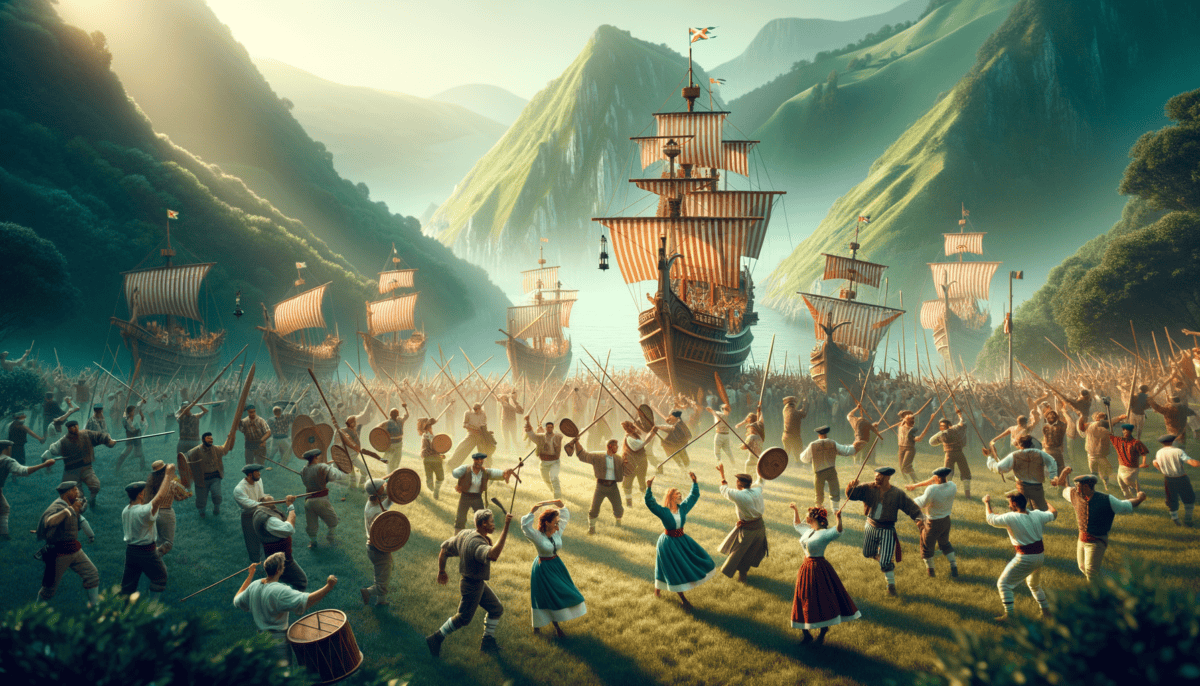The Ancient Whispers
High in the Pyrenees mountains, where clouds touch the peaks like soft cotton candy, lived little Maite and her family. Their home sat nestled between green hills that rolled like waves in the sea. ️
"Amatxo," Maite called to her mother one morning, using the special Basque word for 'mom.' "Why do we speak differently from the children in the valley?"
Her mother smiled, stirring a pot of bubbling kalimotxo stew. The warm kitchen filled with delicious smells of peppers and herbs that grew in their garden.
“Our language is called Euskara,” she explained. “It’s older than the mountains themselves. Nobody knows exactly where it came from – it’s like a beautiful mystery that’s been passed down through countless generations.”
Maite's eyes grew wide. "Older than the mountains? Really?"
Her grandfather, or 'aitona,' sat in his favorite chair by the window. His eyes twinkled as he joined the conversation. "Indeed! Our people have lived in these valleys since before anyone can remember. We're different from all other Europeans – our language doesn't come from any other language in the world."
That evening, as the sun painted the mountains golden, Maite's whole family gathered for dinner. Her father brought fresh bread from the village, while her older brother Mikel helped set the table. This was how it had always been – family coming together, sharing stories, keeping traditions alive.
"Tell me more about our people, Aitona," Maite begged between bites of crusty bread dipped in olive oil.
Her grandfather leaned forward. "We are shepherds and farmers, sailors and craftspeople. For thousands of years, we've lived in harmony with these mountains and valleys. Our customs and traditions are as strong as the oak trees that grow on our hills."
He pointed to the spiral design carved into their wooden table. "See this lauburu? It's our special symbol. Each curl represents different parts of life – spirit, nature, earth, and sun. Everything connected, just like our people."
The Village Festival
The next day was special – the whole village gathered for a festival. The air filled with the sound of txistu flutes and drums. Dancers moved in circles, their red and white clothes spinning like flowers in the wind.
"Watch carefully," Maite's mother said as they joined the dance. "These steps tell stories of our past. When you dance them, you're connecting with all the Basque people who danced them before."
Maite tried to follow along, her small feet copying the patterns. She felt something magical – like she was part of something bigger than herself.
• Amatxo – Mom
• Aitona – Grandfather
• Euskara – Basque language
• Lauburu – Traditional spiral symbol
As stars began twinkling above the mountains, Maite sat with her family around the village bonfire. She listened to old songs sung in Euskara, watched the shadows dance on happy faces, and felt proud to be Basque.
"Remember, maitea," her mother whispered, using the gentle word for 'dear one,' "our greatest strength isn't in our mountains or our farms. It's in our hearts and minds, in the stories we tell, and the language we speak. That's what makes us who we are."
Maite nodded, snuggling closer to her mother. The fire crackled, sending sparks up toward the night sky, each one carrying a piece of their ancient story into the future.
Winds of Resistance
Maite sat at her aitona’s feet one stormy evening, thunder rumbling outside their cozy stone house. “Tell me about the old days,” she pleaded. “How did our people stay strong when others tried to change us?” ️
Her grandfather’s eyes sparkled as he began the tale. “Long, long ago, when mighty Rome ruled most of Europe, they tried to conquer our mountains. But our ancestors were clever and brave.”
“The Romans had big armies,” he continued, gesturing with his hands. “But we knew every path, every cave, every hidden valley. We were like the wild mountain goats – quick and sure-footed where others stumbled.”
“What about the Vikings?” Mikel asked, joining them by the fireplace. “I heard they came in their dragon ships!”
Aitona nodded. “Ah yes, the Norse raiders! They were fierce warriors from the cold north. But when they sailed their ships to our coast, they found something surprising.”
The Clever Defenders
“What did they find?” Maite leaned forward, excited.
“They found that we Basques were already master sailors! We knew the Bay of Biscay like the backs of our hands. We could spot their ships coming and warn everyone with smoke signals from the hilltops.”
Their mother brought hot chocolate made with local sheep’s milk, listening as Aitona continued. “Our people worked together in a special way. Each village had its own council where everyone had a voice – even women, which was very unusual for those times!”
• Village councils called ‘batzarrak’
• Everyone helped make decisions
• Women had equal rights
• Elders were highly respected
“One of our greatest heroes was Mari,” their mother added, sitting down with them. “She wasn’t a warrior, but a wise woman who taught us to respect nature and live in harmony with the land.”
Maite imagined Mari, the legendary guardian of their mountains, watching over them even now. “Is that why we still have our special ceremonies and dances?”
“Exactly!” Aitona smiled. “Every dance step, every song, every word in Euskara is like a precious jewel we’ve kept safe through time. When others tried to make us forget who we were, we held on tighter to our traditions.”
The Strong Community
“Our strength was never just in fighting,” he explained, pulling out an old family photo. “It was in staying together, helping each other. When one family needed help building a house, the whole village came. When it was time to bring in the sheep for shearing, everyone pitched in.”
“We still do that!” Maite exclaimed, remembering last month’s barn raising at neighbor Patxi’s farm.
“That’s right, maitea. And that’s why we’re still here, still speaking our ancient language, still dancing our traditional dances. Because we never forgot who we are.”
Outside, the storm began to fade. Through the window, Maite could see the mountains emerging from the mist, strong and unchanging, just like her people. She felt proud knowing that her ancestors had been so brave and clever.
“Tomorrow,” her mother said, “we’ll visit the old stone circle on the hillside. It’s been there since before the Romans came, and it has more stories to tell.”
As Maite drifted off to sleep that night, she dreamed of brave Basque sailors outsmarting Viking ships, of wise women like Mari protecting the mountains, and of villages coming together to keep their precious traditions alive through the ages.
Maritime Pioneers
The salty breeze ruffled young Josu’s hair as he stood at the harbor of Bermeo, watching the fishing boats bob gently in the water. His aita (father) was preparing their txalupa, a traditional Basque fishing boat, for tomorrow’s journey.
“Did you know, Josu,” his aita said while checking the nets, “that our people were some of the first to hunt whales and fish for cod in distant waters?”
“Really?” Josu’s eyes widened with wonder. “Tell me more about our sailor ancestors!”
Brave Sea Explorers
“Long ago,” aita began, securing a rope, “our people built special boats called ‘naos.’ These ships were strong enough to cross the big Atlantic Ocean. We were among the first Europeans to reach places like Newfoundland!”
Josu helped his father coil the ropes as he continued the story. “Our sailors were very smart. They made special tools for finding their way across the ocean. They even had secret maps!”
“But the most amazing thing,” aita smiled, “was how they preserved cod fish. They learned to salt it just right, so it would last for months on long journeys.”
Adventures on the Sea
As they worked, aita told stories of brave Basque sailors who followed the whales across dangerous waters. “They had to be very careful,” he explained. “The seas were rough, and the whales were huge!”
• Building strong ships
• Finding ways across the ocean
• Preserving fish with salt
• Hunting whales safely
“Sometimes,” aita continued, “our sailors would be gone for many months. They built camps on distant shores where they could process whale oil and dry fish. Some of these camps can still be found in Canada today!”
Josu imagined those brave sailors, so far from home. “Weren’t they scared?”
“They were brave,” aita replied, “but they were also very prepared. They knew how to read the weather and the waves. They worked together as a team, just like we still do today.”
Trading with the World
The sun was setting now, painting the harbor in beautiful orange and pink colors. “Our sailors didn’t just fish,” aita explained. “They traded with people from many different lands. They brought back new foods, ideas, and stories.”
“That’s why we have words in our language from so many places!” Josu realized, remembering what his teacher had told him.
“Exactly!” aita beamed. “And we shared our knowledge too. We taught others how to build better ships and catch fish in new ways.”
As they finished preparing the boat, amama (grandmother) arrived with their dinner in a basket. “Are you filling Josu’s head with sailing stories again?” she asked with a smile.
“Tomorrow,” aita promised, “you can come with me on the boat. Would you like that, Josu? We’ll follow the same waters our ancestors did.”
That night, as Josu lay in bed, he could hear the waves lapping against the harbor walls. He dreamed of ancient Basque ships sailing across vast oceans, of whale hunts in icy waters, and of brave sailors discovering new lands.
The next morning would bring his own first real adventure at sea, carrying on the proud traditions of his seafaring ancestors. Maybe someday, he thought, he’d have amazing stories to tell his own children about life on the waves.
The Language Keepers
Amaia sat cross-legged on her amama’s kitchen floor, watching her grandmother cook traditional talo bread. The warm, nutty smell filled their small mountain home as her amama hummed an ancient Basque song.
“Amama,” Amaia asked, “why do we speak differently from our neighbors in France and Spain?”
A Special Gift
Amama smiled, kneading the dough with practiced hands. “Our language, Euskara, is like a precious jewel passed down from our ancestors. It’s special because it’s not like any other language in the world.”
“But how did we keep our special words when everyone around us speaks differently?” Amaia wondered.
“Ah,” amama’s eyes twinkled, “that’s because of people like your great-grandfather. He was a bertsolari – a person who makes up poems in Euskara right on the spot!”
Secret Songs and Stories
“Long ago,” amama continued, “when some people tried to stop us from speaking Euskara, we found clever ways to keep our language alive. We told stories, sang songs, and played games – all in our special words.”
Amaia helped her grandmother shape the bread as she listened. “Sometimes, families would gather in secret to speak Euskara. Children learned the language from their parents and grandparents, just like you’re learning from me now.”
• Telling stories to children
• Singing traditional songs
• Writing poems and plays
• Teaching at special schools called ikastolas
Modern Language Warriors
The kitchen door opened, and Amaia’s aita came in from work. He taught at the local ikastola, a school where children learn in Euskara.
“Papa!” Amaia jumped up. “Amama is telling me about our language!”
“Yes,” he smiled, “and now we have special schools where children can learn everything in Euskara. When I was little, there weren’t as many ikastolas as there are today.”
“Really?” Amaia asked, surprised.
“Really,” he nodded. “Now we even have TV shows, books, and music in Euskara. Your favorite cartoon was made right here in the Basque Country!”
Words That Connect Us
As they sat down to eat the fresh talo, Amaia noticed how her family switched easily between Euskara and Spanish. It was like having a secret superpower!
“You see,” amama said, spreading honey on the warm bread, “our language is more than just words. It’s like a bridge that connects us to all the Basque people who came before us.”
“And to all the Basque people around the world!” aita added. “There are people speaking Euskara in places as far away as Argentina and the United States.”
That evening, as stars began twinkling outside their mountain home, amama taught Amaia a traditional Basque lullaby. The little girl felt proud knowing she was part of this long chain of language keepers, helping to keep their special words alive for future generations.
As she drifted off to sleep, Amaia dreamed of all the Basque children throughout history who had learned these same words from their amamas and aitas, keeping their unique language strong and alive through the ages.
Dreams of Tomorrow
The morning sun peeked through the cloudy skies over Bilbao as Mikel walked to his first day at university. The modern glass buildings sparkled next to old stone houses.
A City of Changes
“Look how different everything is now,” Mikel’s ama said, pointing at the famous Guggenheim Museum that looked like a giant silver ship. “When I was young, this was all factories.”
“But we still have our txokos, right?” Mikel smiled, thinking of the special cooking clubs where Basque people gather to share meals and stories.
“Some things change, but the important things stay the same,” Ama said with a warm smile.
New Ways to Be Basque
In his university class, Mikel met students from all over the world. Some were surprised to learn about Basque culture.
“You mean your language isn’t like Spanish or French?” asked Sarah, an exchange student from America.
“Nope!” Mikel laughed. “And now we even have Basque apps and video games. My little sister learns Euskara on her tablet!”
• Digital language learning tools
• Rock music in Euskara
• Modern art museums
• Traditional sports in new settings
• Food fusion restaurants
Standing Strong Together
After class, Mikel joined his friends at a protest for Basque rights. They waved flags and sang both old songs and new rap music in Euskara.
“We want to decide our own future,” his friend Ane explained to Sarah. “Being Basque today means keeping our traditions while moving forward.”
A Taste of Change
That evening, Mikel took his new friends to a modern pintxos bar. The chef made tiny bites of food that mixed Basque recipes with new ideas.
“This is cod just like my amama makes,” Mikel said, “but with Japanese sauce!”
“And look,” Ane pointed to the wall covered in street art, “that’s a traditional Basque pattern made into graffiti!”
Looking Forward
Walking home under the stars, Mikel thought about how his people had changed with the times while keeping their spirit strong. His phone buzzed with a message from his amama – in Euskara, sent with heart emojis.
Tomorrow, he would go to a pelota game, the traditional Basque sport, played in a modern sports center. Then he would help teach kids to code in Euskara at the community center.
The city lights twinkled around him like stars, reminding him that being Basque wasn’t just about looking back at history. It was about carrying their special culture forward into the future, one step at a time.
Dancing with Heritage
The summer festival filled the streets of San Sebastián with music and laughter. Colorful flags waved in the breeze as children danced to txalaparta beats.
A Special Day
“Today is magical,” Mikel’s amama said, watching young dancers spin in traditional red and white clothes. Her eyes sparkled with happy tears.
“When I was little, we couldn’t celebrate like this in public. Now look – our culture is alive everywhere!”
Food and Friends
At the festival food stands, chefs served both old and new Basque dishes. Mikel’s friend Sarah tried everything.
“This fish soup is just like my amama makes,” Mikel said. “But try these new chocolate pintxos too!”
Groups of friends gathered at long tables, sharing stories in Euskara and many other languages. ️
Songs of Tomorrow
On the main stage, a young band played rock music with traditional Basque instruments. The crowd jumped and sang along to both old folk songs and new hits.
• Food festivals mixing old and new recipes
• Music combining rock and folk styles
• Sports played in modern arenas
• Language apps for young learners
• Street art showing traditional patterns
Stories That Last
“See that little girl?” Ane pointed to a child teaching her foreign friend some Euskara words. “That’s how our culture stays strong – by sharing it with love.”
As the sun set, families gathered to watch bertsolaris – poetry singers who made up verses about modern life using ancient patterns.
Tomorrow’s Dance
Under the starlit sky, Mikel joined the final dance. Young and old, locals and visitors, everyone moved together in a big circle.
“This is what being Basque means,” he thought. “Keeping our special culture while welcoming new friends and ideas.”
Later, walking home with his family, Mikel saw his little sister teaching Sarah a traditional dance move, while Sarah showed her how to take the perfect selfie.
The lights of the city glowed warmly, like the hearts of the Basque people. Their culture had survived for thousands of years by changing with the times while keeping its special spirit.
Tomorrow would bring new challenges and changes. But the Basque people would face them together, dancing their ancient dances to modern beats, speaking their unique language in new ways, and sharing their stories with the world.
As Mikel looked at the mountains that had watched over his people for so long, he smiled. The future of Basque culture was bright, and everyone was invited to be part of its continuing story. ✨


